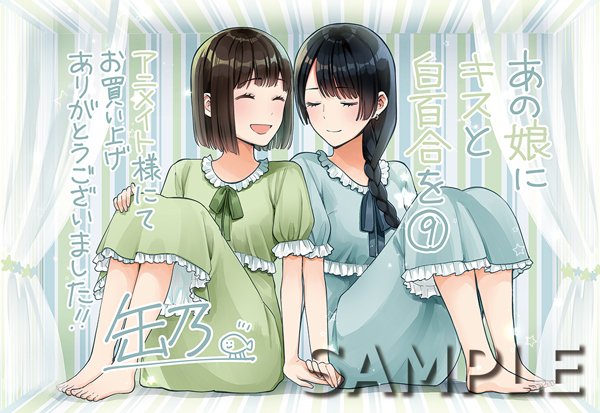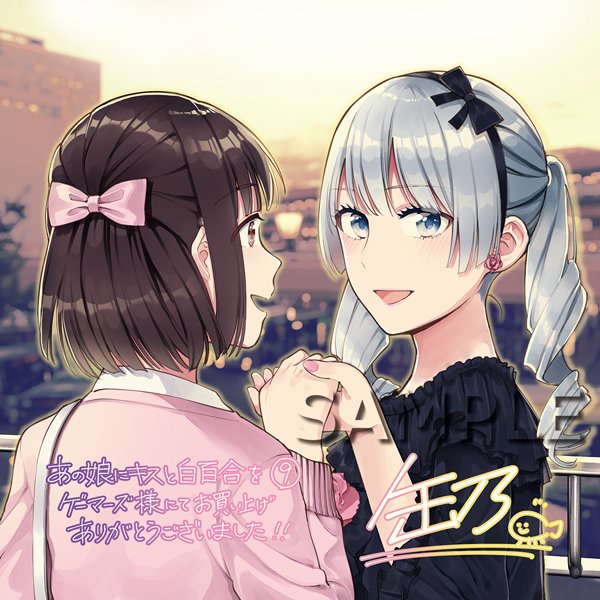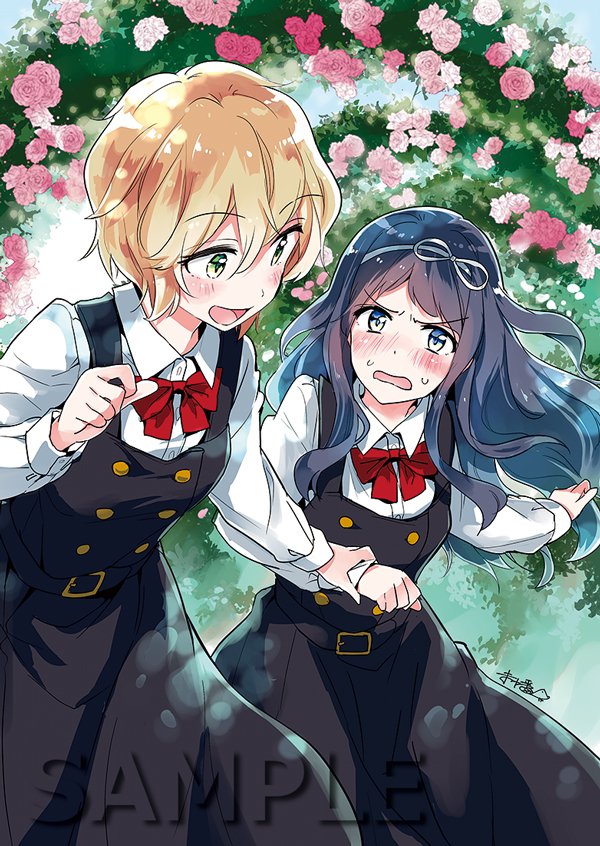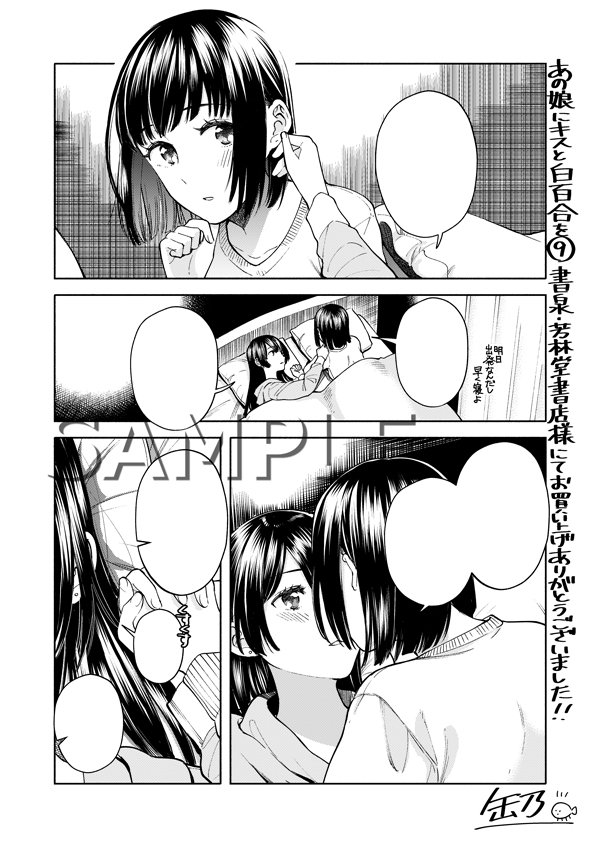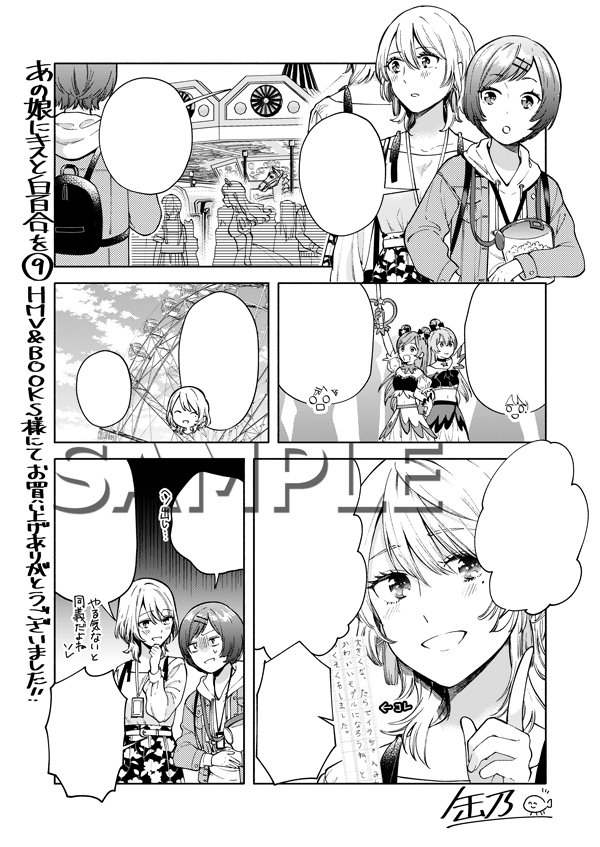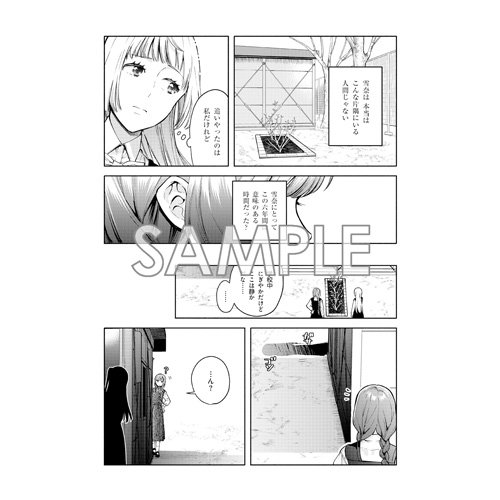Forum › A Kiss And A White Lily discussion
Somehow this entire break up and rebound felt silly to me. But it was still too sweet to call it bad. Asuka's outfit when she left in the train was amazing tho!
Bonus page: Never give a determined student such a loophole teach. You gonna end up swept off your feet~
I still don't like that cosplayer girl. Her way to go about things is just annoying for me. Still, i'm a sucker for happy endings so i still liked the chapter.
Dat Teacher-Student single-page, I need more of that couple, like, right now.
I'm actually wondering why Canno hasn't done a student-teacher romance yet since thats like a standard for a yuri story set on a school full of lesbians. I hope we get to see that with a little twist in the future. Something like a teacher being the one pursuing for a relationship while the student is still in school cuz she knows no one is serious about it after graduation or something like that.
Yeah, I still don't like her. Gimme that student-teacher instead
So... four years of long distance relationship? Well... at least one of them is so unlikeable she isn't likely to end up having someone else try to steal her away...
Somehow this entire break up and rebound felt silly to me. But it was still too sweet to call it bad. Asuka's outfit when she left in the train was amazing tho!
I think for me the whole arc seemed kind of distanced because with all the other couples (or triads) they were either already together or the story was about them getting together (or not).
But in this one we see the pair breaking up before we even have the slightest idea who they are or what they’re about. And then Asuka’s story/motivation for the breakup didn’t seem particularly compelling.
It didn’t help that the arc was interrupted by the Long-Awaited Big Damn Event, either.
Nice! Pages 6 & 7 = first canonical reference to knockin' boots XD
Further proof: this 1-page bonus from Shosen: https://comic-alive.jp/archives/014/201809/2dc51eefa5925d08c88eb58b301aad31.jpg
Nice! Pages 6 & 7 = first canonical reference to knockin' boots XD
Further proof: this 1-page bonus from Shosen: https://comic-alive.jp/archives/014/201809/2dc51eefa5925d08c88eb58b301aad31.jpg
Oh, so we get to see them knockin boots on an extra? Thats nice, even if i dislike one of the girls, the other deserves every good thing that happens to her.
I think for me the whole arc seemed kind of distanced because with all the other couples (or triads) they were either already together or the story was about them getting together (or not).
But in this one we see the pair breaking up before we even have the slightest idea who they are or what they’re about. And then Asuka’s story/motivation for the breakup didn’t seem particularly compelling.
It didn’t help that the arc was interrupted by the Long-Awaited Big Damn Event, either.
I guess that's it. The break-up felt so weirdly unecessary. The idea of wanting to be someone else in itself has depth, but forcing a break-up and getting back together into that was just an excuse to make space for the Yurine and Shiramine plot.
Despite that I feel like Asuka and Mikaze were probably the most experienced and developed couple off-screen. Woulda been nice to see some of that ourselves tho!
last edited at Sep 20, 2018 12:27PM
Well, that was a surpsingly… normal ending to this arc? Obviously Canno wasn't gonna end this on a downer note, but it really felt a bit too easy there. I get what she was going for though − the classic "you don't know what's precious to you until you've lost it", so in that sense the breakup was necessary; and there is some thematic resonance with the AyaYuri arc running in parallel. But it's the kind of arc that makes me wish Canno wasn't so adamant in starting and ending an arc in a single volume. Hell, Izumi and Chiharu had 7 full chapters (plus a Drama CD) dedicated to them, and it was for the better.
Nice! Pages 6 & 7 = first canonical reference to knockin' boots XD
Further proof: this 1-page bonus from Shosen: https://comic-alive.jp/archives/014/201809/2dc51eefa5925d08c88eb58b301aad31.jpg
…Goddammit, when I read those pages I thought "yeah, they probably didn't get much sleep that night", but I didn't think it'd be confirmed. >.> Why does Canno include different bonus pages depending on where you buy the volumes though? TT.TT She could just put them all in the regular editions… There are several bonus pages like that we'll never get to see…
edit: Oh, and chart.
last edited at Sep 20, 2018 2:27PM
I mean, there's a chance she could just be chastely saying "Does my breath stink? Here, let me roll on top of you so you can smell." Thus necessitating the toothbrush. Or, you know, something else that contradicts what the artwork is communicating. Like maybe Asuka is telling her that they can't fool around because she doesn't want to risk getting pregnant or something before she goes off to college.
Edit: the joke is that Asuka is kinda dumb, that's all ;)
last edited at Sep 20, 2018 7:12PM
I can totally buy lesbian pregnancy being a thing in a world where men don't exist. X)
anyone know how many chapters there are for this?
With all the secondary characters, there should be tags for each chapter indicating which characters are involved... it’s hard to track individual story arcs in this yuri epic.
Hah... For some reasons I have no idea who they are.
I seriously need to pay more attention and maybe reread.
I asked a version of this translation question in another thread with no replies, so I'm asking here. It's a phrase I've seen in a number of different translated manga in several different places.
The translation is: "First time I see you here," when the usual phrase would be, "First time I have seen you here."
Technically speaking, it's the use of simple present tense ("see") for present perfect tense ("have seen").
I've seen this error (if that's what it is) many, many times in a number of translated manga. This series especially comes to mind because it's repeated three different times when depicting the meeting between Itsuki & Sawa (the model/forgotten childhood friend). A version of it also appears in the latest chapter on p. 13 when the cosplayer says to Asuka, "Isn't it the first time you cosplay this character?" when standard English would be "you have cosplayed" or "you are cosplaying," etc.
What's puzzling about it is that it shows up in translations that otherwise use even more complicated English verb tenses correctly, including conditional tenses ("would have been," etc.) and present continuous tense ("I am seeing"), among others.
Is there something about Japanese grammar that makes "I have seen" (or "I have never seen") a particularly tough one? Or is it a dialect or idiom of some kind?
I asked a version of this translation question in another thread with no replies, so I'm asking here. It's a phrase I've seen in a number of different translated manga in several different places.
The translation is: "First time I see you here," when the usual phrase would be, "First time I have seen you here."
Technically speaking, it's the use of simple present tense ("see") for present perfect tense ("have seen").
I've seen this error (if that's what it is) many, many times in a number of translated manga. This series especially comes to mind because it's repeated three different times when depicting the meeting between Itsuki & Sawa (the model/forgotten childhood friend). A version of it also appears in the latest chapter on p. 13 when the cosplayer says to Asuka, "Isn't it the first time you cosplay this character?" when standard English would be "you have cosplayed" or "you are cosplaying," etc.
What's puzzling about it is that it shows up in translations that otherwise use even more complicated English verb tenses correctly, including conditional tenses ("would have been," etc.) and present continuous tense ("I am seeing"), among others.
Is there something about Japanese grammar that makes "I have seen" (or "I have never seen") a particularly tough one? Or is it a dialect or idiom of some kind?
I don't think it's necessarily grammatically incorrect. If you read it as, "(It's the) First time (that) I see you here," then it's all present tense. It's not something an English speaker would usually say but it might be closer to the Japanese while still not breaking any rules.
I asked a version of this translation question in another thread with no replies, so I'm asking here. It's a phrase I've seen in a number of different translated manga in several different places.
The translation is: "First time I see you here," when the usual phrase would be, "First time I have seen you here."
Technically speaking, it's the use of simple present tense ("see") for present perfect tense ("have seen").
I've seen this error (if that's what it is) many, many times in a number of translated manga. This series especially comes to mind because it's repeated three different times when depicting the meeting between Itsuki & Sawa (the model/forgotten childhood friend). A version of it also appears in the latest chapter on p. 13 when the cosplayer says to Asuka, "Isn't it the first time you cosplay this character?" when standard English would be "you have cosplayed" or "you are cosplaying," etc.
What's puzzling about it is that it shows up in translations that otherwise use even more complicated English verb tenses correctly, including conditional tenses ("would have been," etc.) and present continuous tense ("I am seeing"), among others.
Is there something about Japanese grammar that makes "I have seen" (or "I have never seen") a particularly tough one? Or is it a dialect or idiom of some kind?
I don't think it's necessarily grammatically incorrect. If you read it as, "(It's the) First time (that) I see you here," then it's all present tense. It's not something an English speaker would usually say but it might be closer to the Japanese while still not breaking any rules.
Right, but translation is supposed to give what a [target language] speaker would say. And the words you have added do not correct the grammatical error.
It’s like saying, “I never be here before” instead of, “I’ve never been here before.” Wrong verb tense.
I asked a version of this translation question in another thread with no replies, so I'm asking here. It's a phrase I've seen in a number of different translated manga in several different places.
The translation is: "First time I see you here," when the usual phrase would be, "First time I have seen you here."
Technically speaking, it's the use of simple present tense ("see") for present perfect tense ("have seen").
I've seen this error (if that's what it is) many, many times in a number of translated manga. This series especially comes to mind because it's repeated three different times when depicting the meeting between Itsuki & Sawa (the model/forgotten childhood friend). A version of it also appears in the latest chapter on p. 13 when the cosplayer says to Asuka, "Isn't it the first time you cosplay this character?" when standard English would be "you have cosplayed" or "you are cosplaying," etc.
What's puzzling about it is that it shows up in translations that otherwise use even more complicated English verb tenses correctly, including conditional tenses ("would have been," etc.) and present continuous tense ("I am seeing"), among others.
Is there something about Japanese grammar that makes "I have seen" (or "I have never seen") a particularly tough one? Or is it a dialect or idiom of some kind?
I don't think it's necessarily grammatically incorrect. If you read it as, "(It's the) First time (that) I see you here," then it's all present tense. It's not something an English speaker would usually say but it might be closer to the Japanese while still not breaking any rules.
Informal speech. Slang. Truncated sentences.
This is nothing unusual in English or any other language. People on the street do talk like that. You probably don't even realize how many times you break grammatical rules when you speak or write.
Yes, you can call it lazy, but English is a lazy language anyway.
The translation is: "First time I see you here," when the usual phrase would be, "First time I have seen you here."
...
Is there something about Japanese grammar that makes "I have seen" (or "I have never seen") a particularly tough one? Or is it a dialect or idiom of some kind?
Or it's a translator bias, because afaik, Lyendith is French and translates Ano Kiss to French, then to English.
And in French this sentence is usually full present tense, like, "c'est la première fois que je te vois ici", which literally translates as "It's the first time I see you here".
The English of a non native speaker is often better than a native speaker (uses more complex sentences), but also has sometimes a "different" way of speaking that gives him away.
last edited at Sep 24, 2018 3:47PM
Informal speech. Slang. Truncated sentences.
This is nothing unusual in English or any other language. People on the street do talk like that. You probably don't even realize how many times you break grammatical rules when you speak or write.
Yes, you can call it lazy, but English is a lazy language anyway.
Look, I know how the language works. I actually know a good deal about the patterns of spoken English grammar and how they vary from formal diction, and I have seen many examples of formal and informal speech. Very few of the manga translation examples I’m talking about are even remotely in situations where you would expect slang or street diction (which this is not in any case).
Substitution of simple present tense for present perfect just isn’t very common at all in informal English. (Dropping the auxiliary verb is pretty common, but then the main verb is past tense.)
Standard English: I’ve never seen you here before.
Informal: I never saw you here before.
Slang: I never seen you here before.
Very rare: I never see you here before.
EDIT: I guess I found it—Japanese doesn’t have a present perfect tense, and it’s a challenging one to translate (evidently French also does the same thing as English present perfect but in a different way).
https://cardinalscholar.bsu.edu/bitstream/handle/123456789/195033/PoundsR_2011-3_BODY.pdf;sequence=1
last edited at Sep 24, 2018 4:04PM
Or it's a translator bias, because afaik, Lyendith is French and translates Ano Kiss to French, then to English.
And in French this sentence is usually full present tense, like, "c'est la première fois que je te vois ici", which literally translates as "It's the first time I see you here".
The English of a non native speaker is often better than a native speaker (uses more complex sentences), but also has sometimes a "different" way of speaking that gives him away.
Basically this, yeah. I wasn't even aware that "first time that + present" was a mistake in English. And no one had ever pointed it out to me before, so English speakers don't seem to find it that weird either… But I'll keep it in mind nonetheless.
last edited at Sep 24, 2018 8:29PM
Or it's a translator bias, because afaik, Lyendith is French and translates Ano Kiss to French, then to English.
And in French this sentence is usually full present tense, like, "c'est la première fois que je te vois ici", which literally translates as "It's the first time I see you here".
The English of a non native speaker is often better than a native speaker (uses more complex sentences), but also has sometimes a "different" way of speaking that gives him away.
Basically this, yeah. I wasn't even aware that "first time that + present" was a mistake in English. And no one had ever pointed it out to me before, so English speakers don't seem to find it that weird either…
That kind of explains it, and don't get me wrong--my question was by no means a complaint or even a knock on the accuracy of the translation, just a query about an odd repeated pattern I had noticed in a number of different manga from a variety of sources. And like I said, it appeared in translations that handled even more complex English verb tense/mood constructions very smoothly, so I was wondering if it were a specific Japanese idiom or perhaps something else.
And thanks as always for your translations!
I do wonder what's the reason for native English speakers saying it that way if it's unusual…
But regarding Japanese, there is indeed no convoluted tense to speak of, the nuances are expressed by auxiliaries added to the verbs. And sentences like "it's the first time we've met" often come from non-verbal expressions like "shotaimen" or "hajimemashite".
last edited at Sep 24, 2018 9:48PM
I do wonder what's the reason for native English speakers saying it that way if it's unusual…
But regarding Japanese, there is indeed no convoluted tense to speak of, the nuances are expressed by auxiliaries added to the verbs. And sentences like "it's the first time we've met" often come from non-verbal expressions like "shotaimen" or "hajimemashite".
I was going to mention that I just saw a similar (but not identical) construction a few minutes ago in a very non-yuri manga on a totally different site.
But then I noticed that the translator was: Lyendith. Lol
(The example was, “This is the first time I came here,” where technically the form would be “This is the first time I’ve come here.” But while proper, the main verb itself would be un-idiomatic—usually it would be, “This is the first time I’ve been here.”)
Hmm, what was that series? ^^"
On another note, a compilation of all the volume 9 bonus pages we'll never get to read. ;__; Among other stuff.
